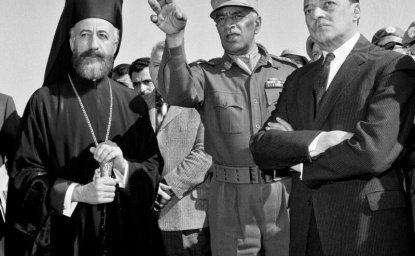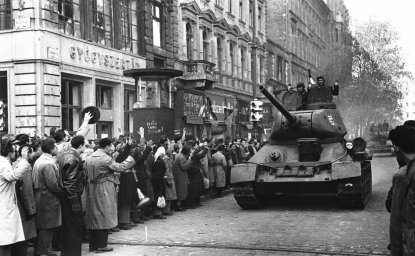Scholars and former government officials convened for a day of discussion on the origins, conduct, and impact of the Iran-Iraq War (1980-1988). The critical oral history workshop, held on July 19, was co-sponsored by the Woodrow Wilson Center's Cold War International History Project (CWIHP) and the Middle East Program in cooperation with the National Security Archive at George Washington University. Participants discussed new evidence to the historical record, providing a stark reminder of how closely connected the current turmoil in the Gulf is to that earlier war and the politics of the time.
To supplement the discussion and shed new light on the subject, the workshop sponsors compiled and distributed two substantial document readers, one filled with recently declassified U.S. government materials culled from the Archive's public collections, the other consisting of dozens of items gathered by CWIHP from the Bulgarian, Czech, German, Hungarian, Iranian, and Russian sources especially for the conference. In the past, CWIHP and the National Security Archive have hosted similar history workshops involving former high-level officials from several countries on such topics as the 1962 Cuban Missile Crisis, the Vietnam War and, more recently, the Soviet invasion of Afghanistan (See report on 2002 Afghanistan conference on this website). But unlike their previous workshops, organizers were hindered by visa problems which prevented former Iranian and Iraqi officials from attending the meeting. Instead, the discussion focused on better understanding U.S., UN, and Soviet bloc perspectives of the war.
Notable panelists included former Assistant Secretary of State Nicholas Veliotes; Ambassador William Eagleton, former chief of mission to a number of American embassies in the Middle East including Baghdad; George Cave, a former CIA official and chief of station in Tehran; Giandomenico Picco, the United Nations official who played the central role in obtaining the ceasefire in August 1988; and Ambassador William Miller, former U.S. ambassador to Ukraine whose first Foreign Service post was in Iran. Two East European diplomats who served in Iran attended: Henner Fuertig from Germany and Zsigmund Kazmer from Hungary. A distinguished group of scholars provided thoughtful questions and helped guide the discussion, including Phebe Marr, Shaul Bakhash, Judith Yaphe, and Mark Gasiorowski.
New evidence
The discussion broke new ground in several areas. It is now clear the United States had learned of Iraqi President Saddam Hussein's plans to invade Iran a full year in advance. The U.S. Department of State had sent a CIA operative to Tehran to warn the provisional government in mid-October 1979, but the Iranian government took no action. When militants seized the U.S. Embassy on November 4, 1979 and took 66 Americans hostage, Washington brought that kind of cooperation to an abrupt halt. The hostage crisis lasted until January 1981 when Iran released all remaining American hostages.These discussions also revealed new information about the origins of the U.S. "tilt" toward Baghdad in late spring of 1982, specifically the role of Ambassador Nicholas Veliotes, in bringing it about via Deputy Secretary of State Lawrence Eagleburger. American officials viewed the export of the Islamic revolution to the Gulf as a far worse threat than that posed by Saddam Hussein's regime and went to considerable lengths to warm up to Baghdad. To that end, the Americans provided battlefield intelligence to the Iraqis and possibly acquiesced in supplying military equipment from other countries, while publicly adopting a neutral stance on the war.
From May 25-28, 1986, U.S. National Security Adviser Robert "Bud" McFarlane secretly visited Tehran to negotiate the release of American hostages held in Lebanon. The delegation was unable to meet with senior Iranian officials and left without resolving the situation. Discussions at the July conference provided new details about the failed mission and how it complicated U.S. policy toward the war.
Although the key participants were former American officials, several new insights into Iranian and Iraqi thinking emerged during the discussion and in reviewing newly declassified documents. A key figure in the interactions with Iranian officials during 1986 explained some of the motivations and priorities of the officials with whom he interacted. For instance, he learned during those conversations, the Iranians were not initially interested in long-term relations with the United States, but were mainly seeking U.S. weapons that conformed to the equipment the Shah had bought from the United States. But over time, it became clear that top-level Iranians saw a more substantial relationship with Washington as increasingly important to Iran's interests, a stance that could eventually have provided the basis for a genuine opening under appropriate circumstances.
The conference did garner useful insights from the international perspective. It was already known that Moscow was ambivalent about the war from the start and tried to discourage Baghdad by temporarily shutting down weapons supplies. According to a former Soviet bloc ambassador to Iran in attendance, the Soviets later renewed arms shipments to Baghdad even as they attempted to improve relations with Tehran.
Giandomenico Picco discussed the vital role of the moderate Arab states—Jordan, Egypt, and Saudi Arabia—both in supporting Iraq's war effort and ultimately, through his collaboration with top UN officials, Saddam Hussein, and members of the Saudi royal family, in negotiating an end to the war.
An Iranian scholar present at the conference said a turning point in Iran's thinking came with the shooting down of an Iranian passenger plane in July 1988 by the American cruiser USS Vincennes. That incident apparently led Ayatollah Khomeini to conclude that Iran could not risk the possibility of U.S. open combat operations against Iran and he decided it was time to end the conflict.
From the Archives Documents freshly acquired for the conference from East European archives provide a wealth of new detail on East European thinking about the war, about relations with Iraq and Iran, and even about the internal situation in Baghdad.
All of the documents presented were especially relevant in gauging U.S. policy at the time and were discussed by U.S. officials for the first time at this conference. An October 7, 1983 State Department memo suggested a possible U.S. shift from neutrality to prevent Iraq's collapse and improve bilateral relations. Official U.S. policy was neutrality, in an attempt to contain the war and preserve a possible future relationship with Iran, among other goals. The United States then began considering a host of diplomatic, military, and financial efforts to help Iraq develop and restore its damaged oil capability and prevent other countries from selling weapons to Iran. Three years later, as the United States was reeling from the Iran-Contra affair, another State Department memo read, "it is difficult to refute the Iraqis' underlying accusation that the U.S. has armed Iran to kill Iraqis."
One U.S. document also revealed concern over chemical shipments in 1984 and a possible Iraqi intent to manufacture chemical weapons. Numerous other records spell out evidence of Iraq's chemical use and the dilemmas this posed for American policymakers. After the war, in 1989, a document from the East German archives disclosed that Iraq did not possess nuclear weapons but was working to modernize missiles acquired from the Soviet Union.
Other East European documents revealed the enormous toll the war was taking on both countries. The Iraqi leadership wanted to end the war by mid-1986, but could not successfully conclude a political settlement. As the records show, Iraq made extensive efforts to approach each government in the Soviet bloc individually, independent of the Soviet Union, and appeal for expanded economic and other ties, as well as to try to influence Moscow's thinking. Among other things, the Iraqis worked out a deal with Bulgaria to train intelligence operatives, to which they tried unsuccessfully to add a promise from the Bulgarians to provide intelligence on Iran. In general, however, the Soviets and their allies appear to have been at least as worried about the United States seeking advantage from the conflict—up to and including seizing the opportunity to move in militarily—as Washington was about Moscow.
One conclusion to take away from these materials is that each Soviet ally, while agreeing with Moscow that the war served only "imperialist" interests, did not appear to be as closely tied to Kremlin dictates, or even fully aware of Soviet policy preferences, as Western observers might have presumed at the time.
More information on this conference, including a full transcript of the discussion, will become available in the coming months on the CWIHP website http://cwihp.si.edu
This report was written by Dana Steinberg. Thanks to Malcolm Byrne, deputy director and director of research at the National Security Archive, for contributing to this report.
Related Links

Cold War International History Project
The Cold War International History Project supports the full and prompt release of historical materials by governments on all sides of the Cold War. Read more


Middle East Program
The Wilson Center’s Middle East Program serves as a crucial resource for the policymaking community and beyond, providing analyses and research that helps inform US foreign policymaking, stimulates public debate, and expands knowledge about issues in the wider Middle East and North Africa (MENA) region. Read more




